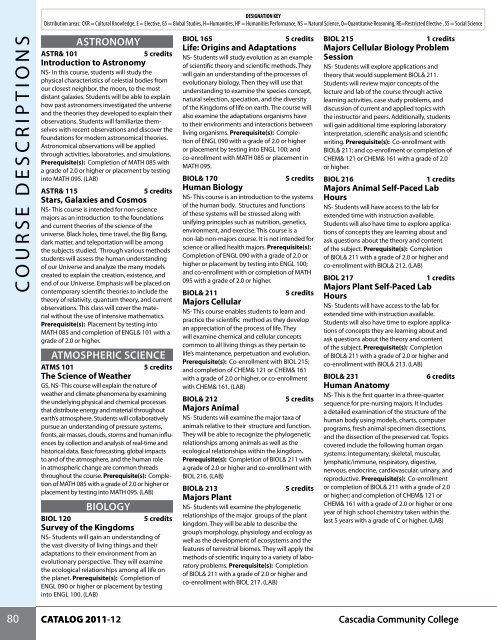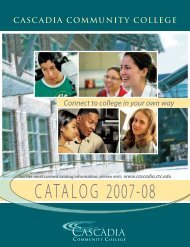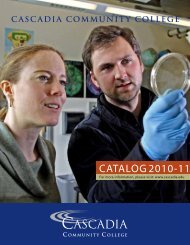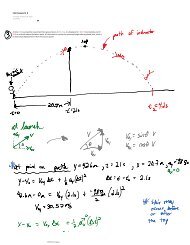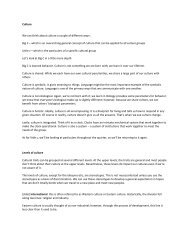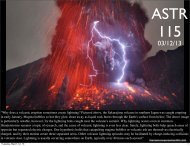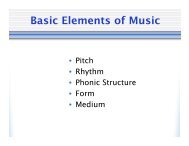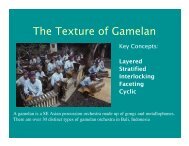2011-12 CATALOG - Cascadia Community College
2011-12 CATALOG - Cascadia Community College
2011-12 CATALOG - Cascadia Community College
You also want an ePaper? Increase the reach of your titles
YUMPU automatically turns print PDFs into web optimized ePapers that Google loves.
DESIGNATION KEY<br />
Distribution areas: CKR = Cultural Knowledge, E = Elective, GS = Global Studies, H=Humanities, HP = Humanities Performance, NS = Natural Science, Q=Quantitative Reasoning, RE=Restricted Elective , SS = Social Science<br />
Course Descriptions<br />
ASTRONOMY<br />
ASTR& 101<br />
5 credits<br />
Introduction to Astronomy<br />
NS- In this course, students will study the<br />
physical characteristics of celestial bodies from<br />
our closest neighbor, the moon, to the most<br />
distant galaxies. Students will be able to explain<br />
how past astronomers investigated the universe<br />
and the theories they developed to explain their<br />
observations. Students will familiarize themselves<br />
with recent observations and discover the<br />
foundations for modern astronomical theories.<br />
Astronomical observations will be applied<br />
through activities, laboratories, and simulations.<br />
Prerequisite(s): Completion of MATH 085 with<br />
a grade of 2.0 or higher or placement by testing<br />
into MATH 095. (LAB)<br />
ASTR& 115<br />
5 credits<br />
Stars, Galaxies and Cosmos<br />
NS- This course is intended for non-science<br />
majors as an introduction to the foundations<br />
and current theories of the science of the<br />
universe. Black holes, time travel, the Big Bang,<br />
dark matter, and teleportation will be among<br />
the subjects studied. Through various methods<br />
students will assess the human understanding<br />
of our Universe and analyze the many models<br />
created to explain the creation, existence, and<br />
end of our Universe. Emphasis will be placed on<br />
contemporary scientific theories to include the<br />
theory of relativity, quantum theory, and current<br />
observations. This class will cover the material<br />
without the use of intensive mathematics.<br />
Prerequisite(s): Placement by testing into<br />
MATH 085 and completion of ENGL& 101 with a<br />
grade of 2.0 or higher.<br />
ATMOSPHERIC SCIENCE<br />
ATMS 101<br />
5 credits<br />
The Science of Weather<br />
GS, NS- This course will explain the nature of<br />
weather and climate phenomena by examining<br />
the underlying physical and chemical processes<br />
that distribute energy and material throughout<br />
earth’s atmosphere. Students will collaboratively<br />
pursue an understanding of pressure systems,<br />
fronts, air masses, clouds, storms and human influences<br />
by collection and analysis of real-time and<br />
historical data. Basic forecasting, global impacts<br />
to and of the atmosphere, and the human role<br />
in atmospheric change are common threads<br />
throughout the course. Prerequisite(s): Completion<br />
of MATH 085 with a grade of 2.0 or higher or<br />
placement by testing into MATH 095. (LAB)<br />
BIOLOGY<br />
BIOL <strong>12</strong>0<br />
5 credits<br />
Survey of the Kingdoms<br />
NS- Students will gain an understanding of<br />
the vast diversity of living things and their<br />
adaptations to their environment from an<br />
evolutionary perspective. They will examine<br />
the ecological relationships among all life on<br />
the planet. Prerequisite(s): Completion of<br />
ENGL 090 or higher or placement by testing<br />
into ENGL 100. (LAB)<br />
BIOL 165<br />
5 credits<br />
Life: Origins and Adaptations<br />
NS- Students will study evolution as an example<br />
of scientific theory and scientific methods. They<br />
will gain an understanding of the processes of<br />
evolutionary biology. Then they will use that<br />
understanding to examine the species concept,<br />
natural selection, speciation, and the diversity<br />
of the Kingdoms of life on earth. The course will<br />
also examine the adaptations organisms have<br />
to their environments and interactions between<br />
living organisms. Prerequisite(s): Completion<br />
of ENGL 090 with a grade of 2.0 or higher<br />
or placement by testing into ENGL 100; and<br />
co-enrollment with MATH 085 or placement in<br />
MATH 095.<br />
BIOL& 170<br />
5 credits<br />
Human Biology<br />
NS- This course is an introduction to the systems<br />
of the human body. Structures and functions<br />
of these systems will be stressed along with<br />
unifying principles such as nutrition, genetics,<br />
environment, and exercise. This course is a<br />
non-lab non-majors course. It is not intended for<br />
science or allied health majors. Prerequisite(s):<br />
Completion of ENGL 090 with a grade of 2.0 or<br />
higher or placement by testing into ENGL 100;<br />
and co-enrollment with or completion of MATH<br />
095 with a grade of 2.0 or higher.<br />
BIOL& 211<br />
5 credits<br />
Majors Cellular<br />
NS- This course enables students to learn and<br />
practice the scientific method as they develop<br />
an appreciation of the process of life. They<br />
will examine chemical and cellular concepts<br />
common to all living things as they pertain to<br />
life’s maintenance, perpetuation and evolution.<br />
Prerequisite(s): Co-enrollment with BIOL 215;<br />
and completion of CHEM& <strong>12</strong>1 or CHEM& 161<br />
with a grade of 2.0 or higher, or co-enrollment<br />
with CHEM& 161. (LAB)<br />
BIOL& 2<strong>12</strong><br />
5 credits<br />
Majors Animal<br />
NS- Students will examine the major taxa of<br />
animals relative to their structure and function.<br />
They will be able to recognize the phylogenetic<br />
relationships among animals as well as the<br />
ecological relationships within the kingdom.<br />
Prerequisite(s): Completion of BIOL& 211 with<br />
a grade of 2.0 or higher and co-enrollment with<br />
BIOL 216. (LAB)<br />
BIOL& 213<br />
5 credits<br />
Majors Plant<br />
NS- Students will examine the phylogenetic<br />
relationships of the major groups of the plant<br />
kingdom. They will be able to describe the<br />
group’s morphology, physiology and ecology as<br />
well as the development of ecosystems and the<br />
features of terrestrial biomes. They will apply the<br />
methods of scientific inquiry to a variety of laboratory<br />
problems. Prerequisite(s): Completion<br />
of BIOL& 211 with a grade of 2.0 or higher and<br />
co-enrollment with BIOL 217. (LAB)<br />
BIOL 215<br />
1 credits<br />
Majors Cellular Biology Problem<br />
Session<br />
NS- Students will explore applications and<br />
theory that would supplement BIOL& 211.<br />
Students will review major concepts of the<br />
lecture and lab of the course through active<br />
learning activities, case study problems, and<br />
discussion of current and applied topics with<br />
the instructor and peers. Additionally, students<br />
will gain additional time exploring laboratory<br />
interpretation, scientific analysis and scientific<br />
writing. Prerequisite(s): Co-enrollment with<br />
BIOL& 211; and co-enrollment or completion of<br />
CHEM& <strong>12</strong>1 or CHEM& 161 with a grade of 2.0<br />
or higher.<br />
BIOL 216<br />
1 credits<br />
Majors Animal Self-Paced Lab<br />
Hours<br />
NS- Students will have access to the lab for<br />
extended time with instruction available.<br />
Students will also have time to explore applications<br />
of concepts they are learning about and<br />
ask questions about the theory and content<br />
of the subject. Prerequisite(s): Completion<br />
of BIOL& 211 with a grade of 2.0 or higher and<br />
co-enrollment with BIOL& 2<strong>12</strong>. (LAB)<br />
BIOL 217<br />
1 credits<br />
Majors Plant Self-Paced Lab<br />
Hours<br />
NS- Students will have access to the lab for<br />
extended time with instruction available.<br />
Students will also have time to explore applications<br />
of concepts they are learning about and<br />
ask questions about the theory and content<br />
of the subject. Prerequisite(s): Completion<br />
of BIOL& 211 with a grade of 2.0 or higher and<br />
co-enrollment with BIOL& 213. (LAB)<br />
BIOL& 231<br />
6 credits<br />
Human Anatomy<br />
NS- This is the first quarter in a three-quarter<br />
sequence for pre-nursing majors. It includes<br />
a detailed examination of the structure of the<br />
human body using models, charts, computer<br />
programs, fresh animal specimen dissections,<br />
and the dissection of the preserved cat. Topics<br />
covered include the following human organ<br />
systems: integumentary, skeletal, muscular,<br />
lymphatic/immune, respiratory, digestive,<br />
nervous, endocrine, cardiovascular, urinary, and<br />
reproductive. Prerequisite(s): Co-enrollment<br />
or completion of BIOL& 211 with a grade of 2.0<br />
or higher; and completion of CHEM& <strong>12</strong>1 or<br />
CHEM& 161 with a grade of 2.0 or higher or one<br />
year of high school chemistry taken within the<br />
last 5 years with a grade of C or higher. (LAB)<br />
80 Catalog <strong>2011</strong>-<strong>12</strong> <strong>Cascadia</strong> <strong>Community</strong> <strong>College</strong>


